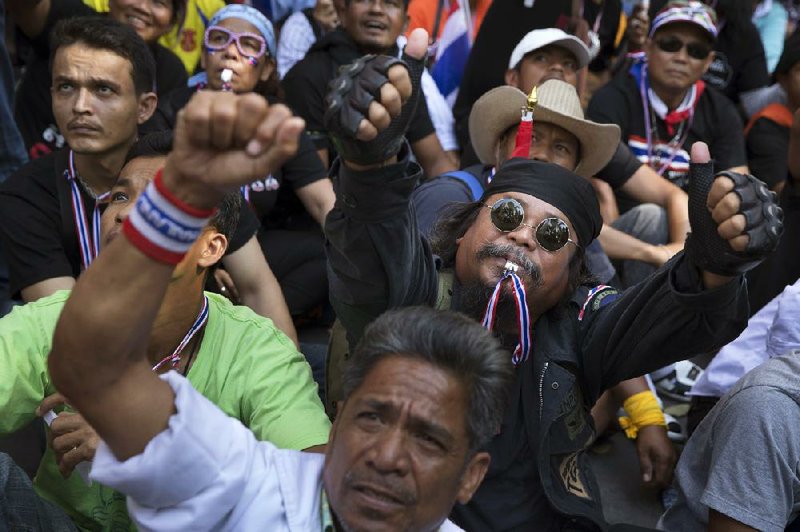BANGKOK - Gunshots rang out in the heart of Thailand’s capital in an attack on anti-government protesters early today that wounded at least two people and ratcheted up tensions in Thailand’s deepening political crisis.
The city’s emergency services office said one man was hit in the ankle and a woman was hit in the arm in the shooting, which occurred on a street leading to one of Bangkok’s glitziest shopping districts that has been occupied by camping demonstrators trying to bring down Prime Minister Yingluck Shinawatra’s government since Monday.
Most of the city has been unaffected by the protests, and Bangkok was calm Wednesday, but the attack was the latest in a string of violent episodes this month that have kept the vast metropolis of 12 million people on edge and fueled fears the nation’s deadlock could spiral out of control.
Also overnight, a small explosive device was hurled into a residential compound owned by former Prime Minister Abhisit Vejjajiva, shattering windows and slightly damaging a roof, said police Col. Chumpol Phumphuang and Abhisit’s opposition Democrat Party.
No injuries were reported, and Abhisit - who resigned from the parliament last month to join protesters - was not home at the time.
As anti-government protesters continued their occupation of key parts of Bangkok’s main commercial and business districts, Prime Minister Yingluck Shinawatra on Tuesday said she was “protecting democracy” and would not resign.
“Democracy belongs to the entire Thai people,” she said in a Twitter message, a day after the leaders of the protests began what they called a shutdown of Bangkok. Although Yingluck’s party is despised by many southerners and members of the Thai elite, it remains very popular in the northern half of the country and is widely expected to win scheduled elections.
The leader of the protests, Suthep Thaugsuban, who has been charged by the authorities with rebellion, threatened Tuesday to “close all government offices” if Yingluck did not step down in the coming days.
“And if she remains stubborn, we will take custody of the prime minister and all ministers,” he said to a cheering crowd at a major Bangkok intersection blocked by protesters.
Protesters are demanding the “eradication” from politics of Yingluck and her brother, Thaksin Shinawatra, a business tycoon and former prime minister.
Yingluck called elections, scheduled for Feb. 2, as an early response to the protests. But the demonstrators are opposed, arguing that the vote would provide the Shinawatra clan greater domination of the political system. They would like, instead, to institute an alternative form of government involving an unelected “people’s council” that would replace Parliament.
Thaksin has been accused several times of using the powers of the state - and the weight of his political party - to further his interests. When he was in power from 2001 to 2006, Thaksin intimidated the media and sought to control many government institutions that are meant to be independent.
Suthep, a career politician and former deputy prime minister, said he was fighting to banish corruption and the Shinawatra clan. But he has been embroiled in a number of corruption scandals himself. In addition, when he was in power in 2010 a crackdown against protesters supporting Thaksin left more than 90 people dead, and Thailand’s Department of Special Investigation has said he was among those “ordering the military to use live ammunition against protesters.”
He faces murder charges but has said he is innocent. He has not appeared in court, he said, because he is too busy leading the protests.
Protest leaders and the Democrat Party, which is boycotting the election, have rejected Yingluck’s offer to discuss possibly delaying the election.
Until this week the government had been firm that there were no provisions in the law to postpone elections.
Somchai Srisuthiyakorn, an election commissioner who has been vocal in his skepticism that elections can take place on time, said the country risked destruction.
“Don’t claim the limitations of the law and allow the country to be destroyed,” he said.
Yet the Election Commission said it would not attend the government’s proposed forum on the issue, saying a large meeting would be unwieldy. Yingluck’s governing party on Tuesday accused the commission of dragging its feet, “playing politics” and “opposing” the elections.
Information for this article was contributed by Thomas Fuller of The New York Times and by Thanyarat Doksone and Todd Pitman of The Associated Press.
Front Section, Pages 2 on 01/15/2014
